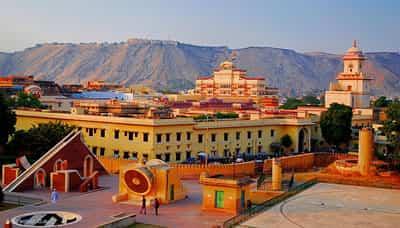Tips for Sustainable Travel in Rajasthan
Tips for Sustainable Travel in Rajasthan
Rajasthan, a vibrant and culturally rich state in India, is a popular tourist destination known for its majestic forts, palaces, and colorful festivals. As you embark on your journey to this enchanting land, it is crucial to be mindful of the impact your travels may have on the environment and local communities. Sustainable travel in Rajasthan is all about exploring the state's natural and cultural treasures while minimizing your carbon footprint and supporting local initiatives. Here are some tips to ensure that your trip to Rajasthan is both memorable and sustainable.
1. Choose eco-friendly accommodations
When planning your stay in Rajasthan, opt for eco-friendly accommodations that prioritize sustainability and promote responsible tourism practices. Look for hotels and resorts that have implemented measures such as waste management, water conservation, and renewable energy sources. Many properties in Rajasthan have adopted eco-friendly practices, such as rainwater harvesting, solar panels, and organic farming. By staying at these establishments, you contribute to the local economy while reducing your impact on the environment.
2. Support local artisans and craftsmen
Rajasthan is famous for its intricate handicrafts, textiles, and traditional artwork. Instead of purchasing mass-produced souvenirs, support local artisans and craftsmen by buying their handmade products. Visit local markets and cooperatives where you can find beautifully handcrafted items made using traditional techniques. By purchasing directly from artisans, you help preserve Rajasthan's rich cultural heritage and support their livelihoods.
3. Respect the wildlife and natural habitats
Rajasthan is home to several wildlife sanctuaries and national parks, including the famous Ranthambore National Park and Sariska Tiger Reserve. When visiting these areas, maintain a respectful distance from the animals and follow the instructions of the park authorities. Avoid littering and do not disturb the natural habitats by venturing off designated trails. By being responsible visitors, we can ensure the protection and conservation of Rajasthan's diverse wildlife.
4. Use public transport or eco-friendly transportation
Reduce your carbon footprint by opting for public transport or eco-friendly modes of transportation whenever possible. Rajasthan has an extensive network of buses and trains that connect major cities and towns. By using public transport, you not only reduce the environmental impact but also get an opportunity to interact with locals and experience their way of life. If you prefer private transportation, consider hiring electric or hybrid vehicles to reduce carbon emissions.
5. Conserve water and electricity
Rajasthan is known for its arid climate, and water scarcity is a significant challenge in many regions. Be mindful of your water usage and try to conserve it as much as possible. Take shorter showers, turn off the tap while brushing your teeth, and reuse towels during your stay at hotels. Similarly, practice energy conservation by switching off lights, fans, and air conditioners when not in use. These small steps can go a long way in reducing your environmental impact while traveling in Rajasthan.
6. Enjoy local cuisine and support sustainable dining
Rajasthan is a food lover's paradise, offering a wide range of delectable dishes and street food. Embrace sustainable dining by trying local cuisine made with fresh ingredients sourced from nearby farms and markets. Support local food vendors and restaurants that promote sustainable practices, such as using organic produce and minimizing food waste. By being conscious of the food choices you make, you can support sustainable agriculture and reduce the carbon footprint associated with food production and transport.
7. Engage with local communities and traditions
One of the best ways to experience the essence of Rajasthan is by immersing yourself in the local culture and traditions. Engage with the local communities, attend cultural festivals and events, and learn about their way of life. Respect their customs, traditions, and dress codes while visiting religious sites and monuments. By interacting with locals and supporting community-based tourism initiatives, you can have a more meaningful and sustainable travel experience.
8. Minimize plastic waste
Plastic pollution is a significant environmental concern worldwide, including Rajasthan. Carry a reusable water bottle and refill it wherever possible to minimize plastic waste. Avoid using plastic bags and instead carry a cloth or jute bag for your shopping needs. Many hotels and restaurants in Rajasthan have already taken steps to reduce plastic waste by offering alternatives such as paper straws and biodegradable packaging. By avoiding single-use plastics, you contribute to a cleaner and greener Rajasthan.
Conclusion:
Traveling sustainably in Rajasthan is not just about enjoying the breathtaking beauty of the state but also about preserving its natural and cultural heritage for future generations. By following these tips, you can minimize your environmental impact, support local communities, and create a positive difference while exploring this magical land. Let's be responsible travelers and contribute to the preservation and sustainability of Rajasthan's treasures.
Remember, sustainable travel starts with you!
Share this blog post with your friends and family to spread the message of sustainable tourism in Rajasthan!
Disclaimer : The information provided in this blog is for general informational purposes only. While we strive to keep the content accurate and updated, TravelSetu assumes no liability for errors or omissions. If you believe any part of this blog infringes your rights or causes concern, please notify us immediately at info[at]travelsetu[dot]com so that appropriate action can be taken.







